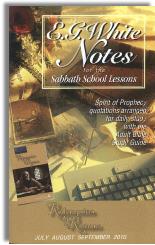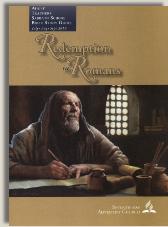|
||||||||||||||
Commentary on "All Have Sinned"
Day 3: Monday, July 12, 2010 - The Human Condition
Overview
Today’s lesson is a fast forward that jumps from chapter 1 of Romans directly to Romans 3:23 which in fact is the end and conclusion of a long argument which takes the entire previous chapters. This move is unusual because it starts backwards with the conclusion, and while the next three days of the lesson are going back to the previous chapters, the flow of Paul’s argumentation is not restated in the natural order, and the main argument is almost invisible.
Observations
For example, we are rightly told that the reality of the universality of sin (“all have sinned”) is recognized when, instead of comparing ourselves with one another and with the imperfect standards of humanity, we look to God’s higher and right standard. While this is true, it nevertheless misses Paul’s way of arguing: that people fail to fulfill even their own imperfect standards, no matter how low they are. Pagans, while rejecting God’s revelation about himself in nature, still have some notion of morality retained in their conscience that tells them what is right and wrong and accuses them (Romans 1:32, 2:15). Jews, in spite of having the special revelation of God’s will in the written law, fail also and stand condemned not only because they commit the same sins as pagans, but especially because they show, when they condemn pagans for sins which they commit also, that they are violating their own standards. Now, if Jews and gentiles alike fail to live even to their own imperfect moral standards which reflect only partially God’s holy and perfect standard found in his law, in God’s eyes they are certainly all guilty because all fail to reflect the original perfect standard of creation, God’s image implanted in man.
While it may be unclear why the author misses the heart of Paul’s argument, his second question from today’s lesson implicitly reveals at least part of the reason. Regarding the ugly description of human sinfulness described in Romans 3:10-18, the author questions the reader about what sins describe his life—or what would describe him if not for Christ. This question betrays the author’s implicit assumption that a true believer has nothing to do with the picture of man’s sinfulness, verses 10-18 being exclusively a description of unbelievers. He misses the fact that the description in these verses describes each person alive. Only when we are credited with the actual external righteousness of Christ Himself can we be counted righteous. We never, in these mortal bodies, stop being what Paul describes. What changes is not the sin in our flesh; what changes is our identity. When we have Christ’s external righteousness credited to us, God no longer considers us the things Paul describes in Romans 3:10-18, and He gives us His life to be able to surrender to Him our temptations to fall back into those sinful ways.
Unfortunately by this assumption that is typical in Adventist theology, the door is opened wide for justification by works of the law. This happens because Paul’s rejection of justification by works of the law in Romans 3:19,20 is based on man’s sinfulness just previously depicted in verses 10-18. Because man is under sin, because man fails to be perfect even according to his own imperfect standards, much less according to God’s standards, nobody can be justified by obedience to God’s holy standard, the law. The law just exposes sin and makes clear that man is a sinner.
Now we know that whatever the law says it speaks to those who are under the law, so that every mouth may be stopped, and the whole world may be held accountable to God. For by works of the law no human being will be justified in his sight, since through the law comes knowledge of sin (Romans 3:19,20).
The awful reality is that born-again Christians are still far from being perfect, far from fulfilling God’s perfect standard, and stand condemned by the law as unconverted sinners described at this point. Consequently the conclusion of Paul that nobody will be justified by the works of the law is valid not only before conversion, but after conversion as well. The law has no power to justify not only sinners but even believers. In our author’s Adventist understanding, his implicit idea that Romans 3:10-18 refers exclusively to unconverted sinners creates an unbiblical category of people who can be justified by works of the law because they are no longer reflecting the sinful state that excludes this possibility.
The reader should mark well these implicit ideas because in this lesson and further lessons the author will affirm repeatedly that man is a sinner and he has no hope but Christ. To conclude that this is nothing else than bona-fide evangelical protestant gospel would be a mistake because the author makes a difference between unconverted sinners and converted sinners in regard to sin, law, salvation. While firmly affirming the impossibility of being justified by works of the law before conversion, he postulates a different relationship with the law after conversion. These different types of sinner-law relationships will become clear in future lessons, and are typical of Adventist’s view of the law.
Summary
- All have sinned and fall short of the glory of God.
- The list of sinful behaviors and attitudes listed in Romans 3:10-18 does not apply only to non-born-again people. It applies even to born again believers.
- In our flesh, we are still sinful; it is the life of God that gives us a new identity while we are in our sinful flesh that causes God to see us as covered by the external righteousness of Christ, never internal righteousness of our own.
- No one, whether an unbeliever or a believer, will ever be counted righteous by the standard of the law. Our flesh is always defined by sin until we are glorified.
- The law has no power to justify either sinners who are unconverted or believers who are born again. Being born again does not change our flesh.
- Being born again means that even though our bodies are still dead in sin, our spirits are alive with Christ’s resurrection life (Rom. 8:10-12).
- Our relationship to the law is the same before conversion as after conversion: condemned. It is only in Christ that we have a different verdict. His Spirit brings our spirits to life, and God credits us with the life and righteousness of Jesus Himself. It is never righteousness that develops in ourselves that qualifies us for God’s approval and for our release from the curse of death.
Copyright 2010 BibleStudiesForAdventists.com. All rights reserved. Revised July 9, 2010. This website is published by Life Assurance Ministries, Glendale, Arizona, USA, the publisher of Proclamation! Magazine. Contact email: BibleStudiesForAdventists@gmail.com.
The Sabbath School Bible Study Guide and the corresponding E.G. White Notes are published by Pacific Press Publishing Association, which is owned and operated by the Seventh-day Adventist church. The current quarter's editions are pictured above.
Official Adventist Resources
Standard Edition Study Guide Week 3
Teacher's Edition Study Guide Week 3
Easy Reading Edition Study Guide Wk 3
Search the Complete Published Ellen G. White Writings


